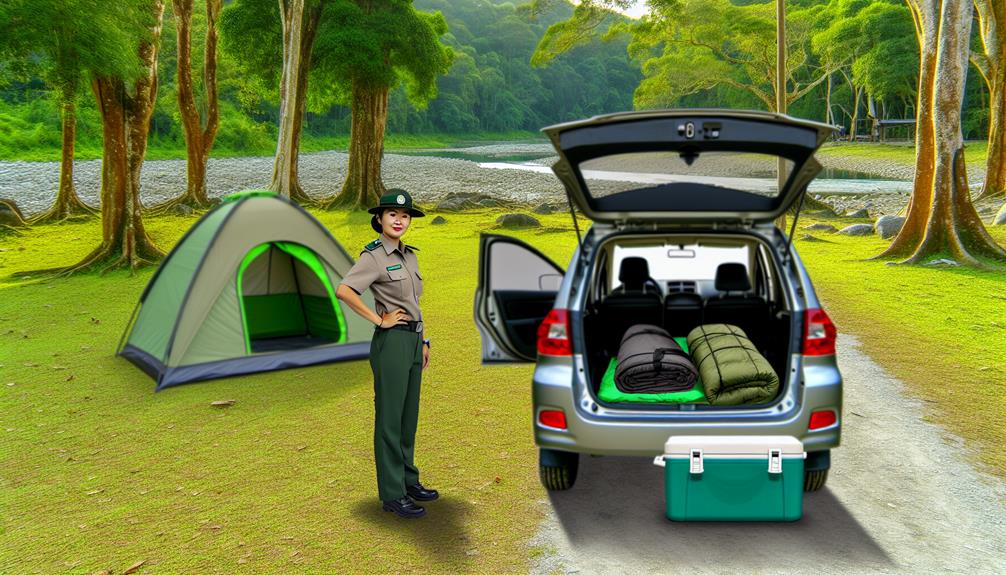Navigating the legalities of car camping in the USA can be a complex task, as regulations vary from state to state. Understanding the specific rules and permits required is essential for a hassle-free experience.
While some states have designated areas for car camping, others strictly prohibit it. By delving into the nuances of these regulations and learning about responsible camping practices, enthusiasts can ensure they stay on the right side of the law while enjoying the great outdoors.
Stay tuned to uncover the key considerations and tips for a smooth car camping adventure in the USA.
Key Takeaways
- Car camping legality in the USA varies by location and is subject to local ordinances.
- State-specific regulations dictate where parking and overnight stays are allowed.
- Permits and restrictions are essential, with some areas requiring permits for overnight stays.
- Understanding and following rules, along with responsible practices, ensure a positive car camping experience.
Legalities of Car Camping in the USA
Car camping in the USA is subject to various legal regulations that vary by location and jurisdiction. When engaging in car camping, it is essential to be aware of local ordinances that dictate where it is permissible to park and camp. Many cities and counties have specific rules regarding overnight parking or sleeping in vehicles to address concerns such as public safety, sanitation, and congestion. Additionally, car camping in designated wilderness areas is often regulated to protect the environment and wildlife. These regulations may restrict where you can park, how long you can stay, and what activities are allowed.
Before embarking on a car camping trip, it is crucial to research the local ordinances of the area you plan to visit to ensure compliance with the law. Failure to adhere to these regulations can result in fines or even legal consequences. By respecting the rules and regulations governing car camping, you can enjoy a safe and sustainable outdoor experience while preserving the natural beauty of wilderness areas for future generations.
State-Specific Regulations to Consider
Considering the diverse legal landscape across the United States, it is imperative to understand the state-specific regulations that govern car camping to ensure compliance and a positive outdoor experience. When engaging in car camping, it is crucial to be aware of the various camping etiquettes and state laws that may differ significantly from one state to another.
For instance, some states have specific rules regarding where you can park and sleep in your vehicle overnight, while others may restrict camping to designated campgrounds only.
Understanding these state-specific regulations is essential to avoid any potential legal issues and ensure a safe and enjoyable car camping experience. Additionally, being knowledgeable about the camping etiquettes of each state helps to promote responsible and sustainable outdoor practices.
Permits and Restrictions for Car Camping
When engaging in car camping across different states in the USA, it is essential to be well-informed about the permits required and any restrictions that may apply to ensure a compliant and enjoyable outdoor experience.
Parking regulations vary depending on the location, with some areas allowing overnight stays in designated lots or campgrounds, while others strictly prohibit parking and camping along certain roads or in specific areas. Wilderness camping, which involves camping outside of designated campgrounds in natural areas, may have additional restrictions to protect the environment and wildlife.
Before embarking on a car camping trip, it is advisable to research the specific rules and regulations of the area you plan to visit. Some national parks and wilderness areas require permits for overnight stays, while others have limited camping spots available on a first-come, first-served basis.
Tips for Safe and Responsible Car Camping
Ensuring the safety and environmental responsibility of car camping requires careful planning and adherence to established guidelines and best practices. When engaging in car camping, it is essential to follow the principles of 'Leave No Trace'. This means cleaning up after yourself, disposing of waste properly, and respecting wildlife and natural surroundings. Car campers should aim to leave the campsite in the same or better condition than they found it to minimize their impact on the environment.
Emergency preparedness is another critical aspect of safe car camping. Before embarking on a car camping trip, ensure you have a well-stocked first aid kit, ample food and water supplies, appropriate clothing for various weather conditions, and a reliable communication device in case of emergencies. Familiarize yourself with the area's regulations and potential risks, such as wildlife encounters or extreme weather, to better prepare for unforeseen circumstances. By combining Leave No Trace principles with thorough emergency preparedness, car campers can enjoy a safe and responsible outdoor experience.
Resources for Further Information
Additional resources for further information on safe and responsible car camping practices can be found through reputable outdoor organizations, government agencies, and online forums dedicated to outdoor recreation. These sources often provide valuable insights into camping etiquette and ways to minimize the environmental impact of car camping.
Outdoor organizations such as the Leave No Trace Center for Outdoor Ethics offer guidelines on responsible outdoor practices, including camping etiquette that promotes respect for nature and other campers. Government agencies like the National Park Service and the Bureau of Land Management also provide information on rules and regulations specific to car camping in public lands, helping campers understand how to minimize their environmental impact.
Online forums dedicated to outdoor recreation are another valuable resource for car campers seeking further information. These platforms often host discussions on best practices, share personal experiences, and offer tips on reducing the environmental footprint while enjoying the great outdoors. By engaging with these resources, campers can enhance their knowledge of safe and responsible car camping, ultimately contributing to a more sustainable outdoor experience for all.
Frequently Asked Questions
What Are the Best Types of Vehicles for Car Camping in the Usa?
When considering the best types of vehicles for car camping in the USA, both van life enthusiasts and those seeking SUV options have a range of choices. Vans offer spacious interiors and customizations, while SUVs provide versatility and off-road capabilities.
Are There Any Specific Etiquette Rules to Follow While Car Camping?
When car camping, it is important to adhere to etiquette rules. Respect fellow campers by maintaining low noise levels, practicing campfire safety, properly disposing of waste, and minimizing wildlife encounters. Following these guidelines ensures a harmonious camping experience.
How Can I Find the Best Campsites for Car Camping in Different States?
When searching for optimal car camping locations across various states, consider factors such as camping gear requirements and destination choices. Research online resources, review camper feedback, and prioritize safety and amenities to ensure a successful trip.
What Are the Potential Risks or Dangers of Car Camping in the Usa?
Safety precautions are essential for car camping in the USA due to potential risks like wildlife encounters. Understanding local regulations is crucial to avoid legal implications. A statistic shows that 50% of campers encounter wildlife while car camping, highlighting the importance of being prepared.
Are There Any Recommended Apps or Websites for Planning a Car Camping Trip in the Usa?
When planning a car camping trip in the USA, consider using budget-friendly accommodations like camping apps or websites. Research road trip essentials, outdoor cooking options, and packing tips to ensure a smooth and enjoyable experience.
Conclusion
In conclusion, car camping in the USA is subject to various legal regulations and restrictions that vary by state. It is important for individuals to obtain necessary permits and adhere to local guidelines to ensure a safe and responsible camping experience.
By being informed and following the rules, campers can enjoy the beauty of nature while respecting the environment and surrounding communities. Remember, compliance with laws and regulations is key to a successful car camping trip.

